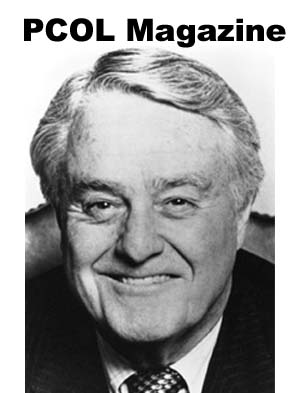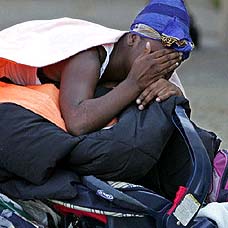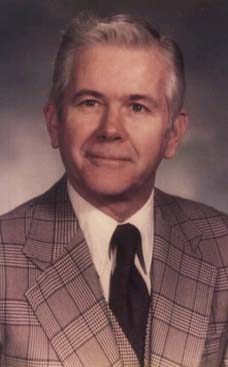
"Some people are quoting the Bible against us in the poverty war, saying, 'The poor always ye have with you,' " Shriver said. He asked the pope if he could suggest a good reply. "Tell them," the pope said, "that they are also commanded by the Bible to feed the hungry and clothe the naked." Maybe we can never win the war. But neither can we turn our backs on it. Sargent Shriver was the Founding director of the Peace Corps.
I am trying to keep in mind a story I read about Sargent Shriver visiting Pope Paul VI in the mid-1960s
Can we win the war on poverty?
Joan Ryan
Thursday, September 15, 2005
Joan Ryan
Say what you will about the president's legacy as a leader, but give him credit for acknowledging the shameful conditions he saw in the Deep South among the most impoverished of his fellow citizens.
The people were, he said, "that other nation within a nation -- the poor -- whose distress has not captured the conscience of America." He pledged help to those who "live on the outskirts of hope -- some because of their poverty, and some because of their color, and all too many because of both." He made this vow:
"This administration today, here and now, declares unconditioned war on poverty in America."
The president was Lyndon Johnson. The year, 1964.
Forty-one years ago.
When you live in the Bay Area, or any of hundreds of prosperous regions, you can pretty much live your entire life without ever seeing dirt-road, tin-roofed shantytowns where cardboard and duct tape pass for windows and rats climb through holes in the floorboards and ragged children sleep on secondhand mattresses on the front stoop and grown men and women have never crossed the county line, much less buckled themselves into an airplane seat.
But when Katrina blew through the Gulf Coast, it ripped a hole in the screen that so nicely separates the truly poor from the rest of us. The 24/7 coverage delivered images of a New Orleans that resembled a South African township more than a major U.S. city. As I watched, I kept thinking about Johnson's vow, and even Herbert Hoover's, who a year before the great collapse of 1929 declared, "We shall soon, with the help of God, be within sight of the day when poverty will be banished from the nation."
So what happened? Why do 30 percent of households in New Orleans have no car? Why do nearly 22 percent of the Mississippi population and 20 percent of Louisiana's still live below poverty level? Why do 1 in 6 children in Mississippi, Louisiana and Alabama still live in abject poverty, their parents earning less than $8,730 a year?
Given the efforts of the past 41 years, a reasonable person could conclude that wars on poverty are unwinnable. Maybe a capitalist republic, by its nature, will always have the extremely poor. After all, there were almshouses in the colonies dating back to 1685. So are we tilting at windmills in thinking that, as the Gulf Coast rebuilds, it can seize the opportunity to change the lives of its poorest residents?
I posed the question to Mark Shriver, who runs the United States operations for Save the Children, which has been helping needy children since the Dust Bowl in 1932. Shriver was a year old when his father, Sargent Shriver, was appointed to lead Johnson's ambitious anti-poverty campaign as director of the new Office of Economic Opportunity. We talked by phone this week as he was heading out to join his colleagues in New Orleans.
There's been great progress overall in diminishing poverty, he said, citing the drop in poverty rates from 20 percent in 1960 to about 13 percent today. "But there are still incredible pockets of poverty, many in the Deep South and the Central Valley south of you," Shriver said.
He believes, as many do, that programs like Head Start -- begun during his father's tenure with the Johnson administration -- alleviate poverty. But all the great programs in the world -- including No Child Left Behind, which Shriver supported -- mean nothing if they don't receive sufficient money to carry them out.
"From the start, Johnson's programs were underfunded," he said. "Head Start is still significantly underfunded. No Child Left Behind is underfunded. And we know that the more educated the population, the lower the poverty rate. We have to provide an education system that gives people the opportunity to pull themselves up."
Despite the failures of the past, Shriver believes, as his father did, that poverty can be eradicated. I envy his hopefulness. I'm having a tough time at the moment relocating my own. Maybe it's the government's breathtaking indifference and incompetence after Katrina coming hard on the heels of mounting deaths and injuries in Iraq. The problems seem too big, too far beyond the grasp of any one of us.
I am trying to keep in mind a story I read about Sargent Shriver visiting Pope Paul VI in the mid-1960s.
"Some people are quoting the Bible against us in the poverty war, saying, 'The poor always ye have with you,' " Shriver said. He asked the pope if he could suggest a good reply.
"Tell them," the pope said, "that they are also commanded by the Bible to feed the hungry and clothe the naked."
Maybe we can never win the war. But neither can we turn our backs on it.
"Hopefully, this disaster will mobilize the government to do something for the people on the Gulf Coast," Mark Shriver said before he went to see the devastation for himself. "The government let them down before, during and immediately after the hurricane. The question is whether it's going to continue to let them down."
E-mail Joan Ryan at joanryan@sfchronicle.com. Her column will run on Thursdays while she is on assignment.












